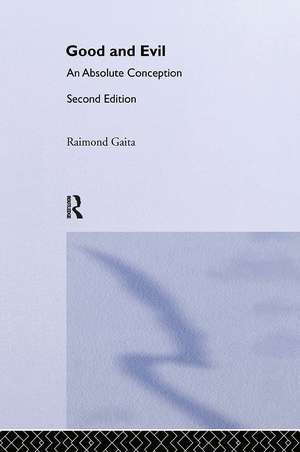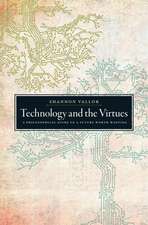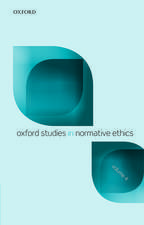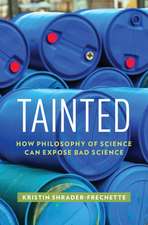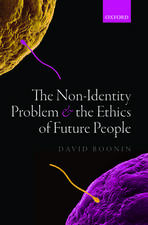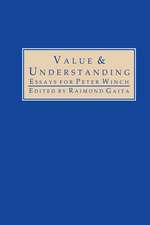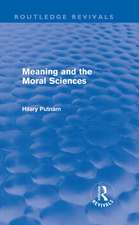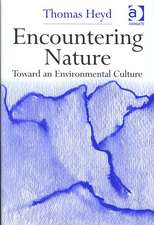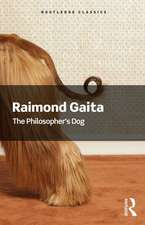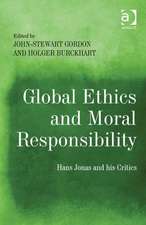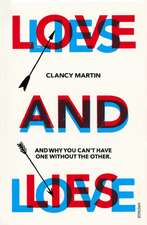Good and Evil: An Absolute Conception
Autor Raimond Gaitaen Limba Engleză Hardback – 26 aug 2004
This revised edition of Good and Evil includes a substantial new preface and afterword by the author.
| Toate formatele și edițiile | Preț | Express |
|---|---|---|
| Paperback (1) | 305.75 lei 6-8 săpt. | |
| Taylor & Francis – 26 aug 2004 | 305.75 lei 6-8 săpt. | |
| Hardback (1) | 1010.53 lei 6-8 săpt. | |
| Taylor & Francis – 26 aug 2004 | 1010.53 lei 6-8 săpt. |
Preț: 1010.53 lei
Preț vechi: 1232.35 lei
-18% Nou
Puncte Express: 1516
Preț estimativ în valută:
193.36€ • 201.90$ • 159.67£
193.36€ • 201.90$ • 159.67£
Carte tipărită la comandă
Livrare economică 15-29 aprilie
Preluare comenzi: 021 569.72.76
Specificații
ISBN-13: 9780415332880
ISBN-10: 0415332885
Pagini: 416
Dimensiuni: 156 x 234 x 27 mm
Greutate: 0.75 kg
Ediția:Revizuită
Editura: Taylor & Francis
Colecția Routledge
Locul publicării:Oxford, United Kingdom
ISBN-10: 0415332885
Pagini: 416
Dimensiuni: 156 x 234 x 27 mm
Greutate: 0.75 kg
Ediția:Revizuită
Editura: Taylor & Francis
Colecția Routledge
Locul publicării:Oxford, United Kingdom
Public țintă
General, Postgraduate, and UndergraduateNotă biografică
Raimond Gaita is Professor of Moral Philosophy at Kings College London and Professor of Philosophy at Australian Catholic University. His books include the award-winning biography of his father, Romulus, My Father, A Common Humanity and The Philosopher's Dog.
Recenzii
'It is a marvellous work, one which ought to change the tone as well as the focus of much contemporary moral philosophy.' - Bernadette Tobin, Australian
'A superb, richly textured discussion which engages directly with real people and their deeply serious moral concerns.' - Brenda Almond, THES
'One can only acknowledge the justice and admire the acuteness of many of its critical contributions to contemporary debates in moral philosophy.' - A.D.M.Walker, Journal of Applied Philosophy
'Gaita's book is very important and need to be addressed.' - Michael McGee, The Philosophical Quarterly
'A marvellous work, one which ought to change the tone as well as the focus of much contemporary moral philosophy.' - Bernadette Tobin, Australian
'A superb, richly textured discussion which engages directly with real people and their deeply serious moral concerns.' - Brenda Almond, THES
'One can only acknowledge the justice and admire the acuteness of many of its critical contributions to contemporary debates in moral philosophy.' - A.D.M. Walker, Journal of Applied Philosophy
'A superb, richly textured discussion which engages directly with real people and their deeply serious moral concerns.' - Brenda Almond, THES
'One can only acknowledge the justice and admire the acuteness of many of its critical contributions to contemporary debates in moral philosophy.' - A.D.M.Walker, Journal of Applied Philosophy
'Gaita's book is very important and need to be addressed.' - Michael McGee, The Philosophical Quarterly
'A marvellous work, one which ought to change the tone as well as the focus of much contemporary moral philosophy.' - Bernadette Tobin, Australian
'A superb, richly textured discussion which engages directly with real people and their deeply serious moral concerns.' - Brenda Almond, THES
'One can only acknowledge the justice and admire the acuteness of many of its critical contributions to contemporary debates in moral philosophy.' - A.D.M. Walker, Journal of Applied Philosophy
Cuprins
Chapter 1 Evil and unconditional respect; Chapter 2 The scope of academic moral philosophy; Chapter 3 Mortal men and rational beings; Chapter 4 Remorse and its lessons; Chapter 5 Evil done and evil suffered; Chapter 6 Naturalism; Chapter 7 Modalities; Chapter 8 Meaning; Chapter 9 Individuality; Chapter 10 ‘An attitude towards a soul’; Chapter 11 Goodness; Chapter 12 Ethical other-worldliness; Chapter 13 ‘The repudiation of morality’; Chapter 14 Ethics and politics; Chapter 15 Moral understanding; Chapter 16 Truth; Chapter 17 Fearless thinkers and evil thoughts;
Descriere
In Good and Evil: An Absolute Conception, Raimond Gaita draws moral philosophy away from the academic study of ethics and considers instead how real people actually talk and feel about morality, using good and evil as examples.
